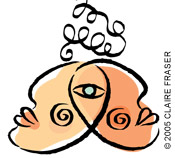
After facing a serious illness, one physician found new meaning in this common question.
Fam Pract Manag. 2005;12(10):70

A year ago, things were going along well for me. I was busy with my practice but enjoying it. My wife and I were approaching our 25th wedding anniversary. The boys were doing well. And my health was good – or so I thought. Then came the bladder cancer, an exceedingly loud and unexpected wake-up call. I found myself facing emergency exams and tests, planned surgery, followed by unplanned surgery in the middle of the night, unpleasant treatments and some complications. I’m doing OK now, feeling well and working again, but my calendar now includes uncomfortable exams and treatment sessions, episodes of panic and dread, and a lot more uncertainty than it did just a year ago.
This has also been a year when a common question has taken on new meaning for me. “How are you doing?” is a question we hear every day. It is best offered while on the move, without making physical or eye contact, and the conventional response is, “Fine. How are you?” Although it’s a question, people really don’t want to know the answer. They just want to convey a bit of courtesy – and then quickly get by the person they’ve met in the hall or parking lot.
But now, the question is more meaningful to me. As I walk through the hospital, I often hear it from people who know of my illness: nurses, clerks, maintenance workers, operating room techs, some patients and, unexpectedly, not a lot of doctors. (I think doctors want to know but are often too embarrassed to inquire.)
Now the question is offered differently: People stop, make eye contact and sometimes extend a hand. They ask more slowly, more intently, and, most striking, they really do want to know. And I tell them, more than I thought I would be telling people not that close to me: I feel OK. The treatments are going well. I’m trying to work less and take better care of myself. I’m going to beat this thing.
They smile at me, sometimes they squeeze my hand, and occasionally they even hug me. It feels wonderful. I feel better, more optimistic about the cancer, better about myself and about our world. And I say, “Thanks for asking” – and mean it. Then I often ask, “And how are you doing?” And I really do want to know. They tell me that their son is doing better, they might get a different job, the back pain is less, they are “making it.” They smile and thank me for asking. We go our separate ways, both feeling better, both looking forward to the next time we meet.
Walking the hospital hallway used to be a way for me to get from point A to point B, and the people I passed along the way were just scenery. No longer. Now I look forward to these unexpected and brief encounters. They give me warmth and strength, and they remind me how fortunate I am to be feeling well and doing what I love. They remind me that we really are all in this together and the most important thing we can do for one another is to care.
So I thank those kind folks for teaching me a good lesson. Now, when a passerby does not ask me how I’m doing, I usually ask them, and we share a few good minutes and thoughts. I want them to feel that I do care about how they are doing, and after my own struggles, I find I really do.
Try it. Slow down. Stop. Look them in the eye. Extend a hand. Smile. Ask. Listen. Respond. It will be great therapy for both of you. And by the way, “How are you doing?” I truly hope you are doing well.